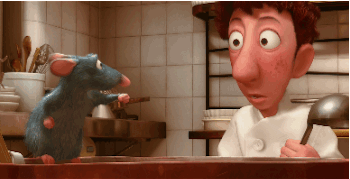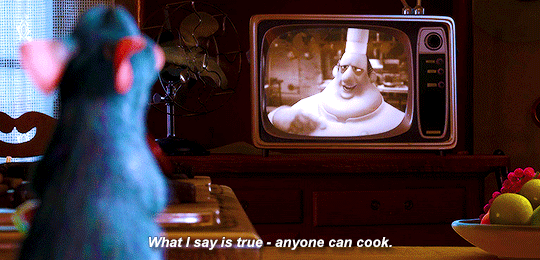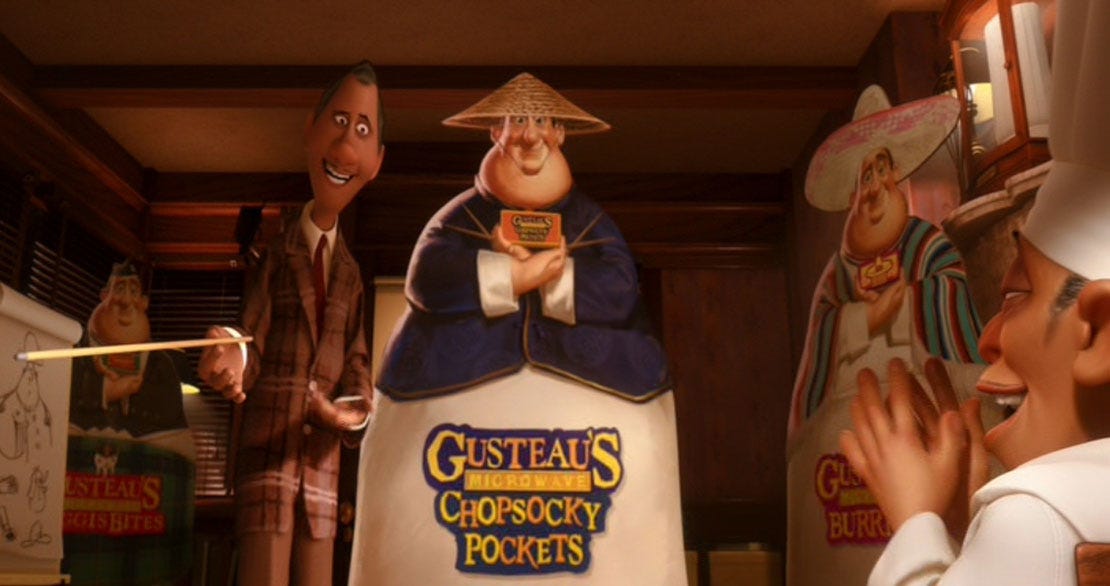To me Ratatouille has always been a film about a cooking rat, which isn’t wrong per se. So I wasn’t expecting anything new when I burrowed myself into the sofa to watch the family favorite on Christmas Eve. As the film progressed, however, I found myself sitting up straight.
Turns out, the film is an allegory for good branding.
Gusteau proclaims that “Anyone can cook” at the start of the film. This statement encapsulates the philosophy behind Gusteau’s brand and establishes the premise of his vision: a prejudice-free world in which anyone (or any entity) can be expected to cook good food. Interestingly, this philosophy elicits different responses from three focal characters.
Remy embraces it.
Skinner dismisses it.
Ego misconstrues it.
Anyone who’s watched the film knows that Skinner is the bad guy on so many different levels. He discriminates, lashes out, is selfish and tries to swindle Alfredo of his fortune. What’s equally problematic as his moral shortcomings is, from a branding perspective, his blatant dismissal of and deviation from Gusteau’s core philosophy “anyone can cook”.
Trouble brews
On the surface level, conflict between Skinner and Alfredo beings when the latter—a shy, clumsy red head with no culinary training—turns out to have a knack for cooking thanks to his “little chef” aka Remy.
If we dig a bit deeper though, the root of the issue is traceable to Skinner’s disbelief in the statement “anyone can cook”. To him, Alfredo is a nobody. No qualifications. No experience. No background. In Skinner’s world, Alfredo is fated to be a “garbage boy” forever. When this worldview starts to tremble, Skinner retreats further into his version of reality where nobodies remain nobodies and does not help Alfredo in his culinary journey (well, he does inadvertently contribute to Alfredo and Colette’s romance, but this is overshadowed by his original intentions to burden the kitchen’s only female chef for speaking out in favor of Gusteau’s philosophy).
Skinner’s condescending attitude towards Alfredo is just the tip of the iceberg. If we zoom out a bit and examine the same issue from a business standpoint, Skinner’s dismissal of the Gusteau philosophy has serious repercussions for both without and within the brand.
Let’s first examine what he does wrong.
Skinner ambitiously launches a frozen food sub-brand that is endorsed by Gusteau’s. In a way, this is his sloppy interpretation of the Gusteau philosophy; he creates a series of frozen food that anybody can literally “cook” by pushing a few buttons on the microwave. The frozen chicken, ribs, dumplings that Skinner has released into the market is followed suit by “cornpuppies”, a downgraded version of corndogs that are essentially “cheap sausages dipped in batter and deep fried”. Yikes. Skinner’s frozen food line detract from Gusteau’s fine dining image, further damaging the restaurant’s already flailing position. Skinner himself remarks that their “reputation is hanging by a thread”, which begs the question: why is he choosing to further dilute it by selling cheap food that contradicts the raison d'être of culinary art?
Put differently, Skinner is jeopardizing the brand’s positioning as a fine dining restaurant.
External risk: brand image corruption
Skinner’s frozen food endeavor is, at heart, a means to generate easy profit. While cranking out a series of cheap microwavable food may be lucrative—they do leech off the Gusteau brand name after all—it is not a long term solution to enhancing or rectifying the brand’s corroded image.
And this is where we turn our eyes to Ego.
It is implied at the start of the film that Ego is to blame for tarnishing Gusteau’s brand reputation and shocking the star chef to death. Ego, a pale man of tall stature with an aura reminiscent of Dracula, is the fake antagonist of the film. He lambasts Gusteau’s for falling low to the “tourists’ trade” and insinuates that the restaurant lacks the dignity so crucial to fine dining. While it is impossible to know for sure what compelled Ego to launch a diatribe against Gusteau’s in the first place, it is highly plausible that Skinner’s vision of making the household name more mainstream may have something to do it. Skinner exhibits no interest in developing new recipes—he nonchalantly instructs his crew to pull out an old recipe to customer requests for a new menu—and is fixated on building a Gusteau’s franchise that ironically undermines the parent brand’s prestige. Hence, whatever dish Gusteau’s presented to Ego under the then sous-chef’s guidance probably did more than ruffle a few of the food critic’s feathers.
As a result, Ego, who is always on the lookout for “perspective” (more on this later), misconstrues Gusteau’s philosophy to mean that anyone may arbitrarily define the standards of good food and honor themselves with the title of chef. In his eyes, Gusteau’s is a shallow mainstream brand posing as a purveyor of fine taste. A brand that does not renovate. A brand that only pretends to pursue culinary dreams of an extraordinary palate while selling this very same, defunct dream to unsuspecting customers.
In other words, the Gusteau brand lacks authenticity. A perception that is further reinforced by Skinner’s attempts to erect a frozen food empire. In Ego’s eyes, Gusteau’s is a brand relevant only to Parisian tourists who come for the vibe and not the food.
Internal risk: organizational discord
At various points in the film we are shown moments in which Skinner interacts with his crew. Considering the top-down nature of the kitchen, Skinner’s commanding tone is not criticizable in itself. He is the head chef after all (do you have the guts to talk back to Gordon Ramsay?).
However, there is a matter on which he should consult the entire crew. A matter that impacts all the members of the organization: the vertical expansion of Gusteau’s via a microwavable sub-brand.
Launching a sub-brand entails risks. The most prominent one being that the sub-brand may negatively impact the parent brand by gnawing away at its prestige. In the case this happens, the members of the parent brand will most likely suffer a blow to their pride which stems from a sense of organizational belonging. Can you imagine how mortified the staff at Tiffany’s would be if they started to see the public associating them with cheap, fast fashion after launching Tiffany’s Brass Desires (not to mention the shock at seeing revenue plummet)? This feeling of humiliation will be coupled by helplessness if employees have no say in how the sub-brand is developed and marketed.
Skinner, unfortunately, makes the mistake of unilaterally deciding to go forward with the frozen food sub-brand. That he does not have the support of his crew is made evident when the latter burn the life-size cardboard figures of frozen food Gusteau’s after he is ousted. Burn baby burn.
Had Skinner solicited the opinion and advice of the other chefs, perhaps the sub-brand may have buoyed Gusteau’s back to relevance, albeit in a different direction. Or perhaps the entire kitchen could have agreed to launch a sub-brand that is not endorsed by Gusteau’s. The possibilities are numerous. It’s too bad Skinner didn’t consult his people before executing a high risk move.
In short, Skinner is a good example of bad leadership. Pray he remains a fictive figure.
“Give me some perspective”
Let’s revisit our cold blooded food critic, Ego, before wrapping up. He says something very important in the film that all branders, storytellers, creators should inscribe into memory. He pompously requests the server at Gusteau’s for some “fresh, clear, well-seasoned perspective” after revisiting the restaurant for the first time in years.
“I’d like some fresh, clear, well-seasoned perspective” —Ego
The server gets flustered upon hearing this and Ego (surprise) loses his temper. Ego’s belligerency might be a bit exaggerated, but he basically represents the eager hardcore customers of any industry.
What Ego is demanding when he asks for “a bit of perspective” as a serious foodie is an innovative take on the familiar. He probably knows the culinary landscape of Paris like the back of his hand. He probably has tried almost every French delicacy Paris has to offer. Therefore, what he wants is simple: a pleasant shock that will transport him to uncharted culinary terrains. A new lexicon of sensory wonders. A revelation.
Remy, our “little chef”, delivers precisely this through his reinterpretation of ratatouille, a peasant dish that catches Skinner (our fly on the wall) off-guard. Yet a dish that awakens a memory in Ego that envelops him in nostalgia.
Ego’s moment of revelation is the moment in which the deceased Gusteau’s brand philosophy is truly reified. Remy, a rat with no professional training in cooking, conjures up a dish that moves the scariest food critic in Paris to tears. And he does so by boldly innovating the recipe instead of following Gusteau’s prescribed one. What’s even more remarkable about this feat is that he does it in collaboration with Alfredo, Colette, and the (rat) clan. He’s the stark opposite of Skinner the dictator.
Remy is the true embodiment of the statement “anyone can cook, but only the fearless can be great”. He innovates recipes for not just food, but for teamwork as well.
In a way, all branders and creators have to cook up new ideas and stories that can enchant the same audiences again and again. People want something fresh. People want perspective.
Are you providing yours?













Really interesting take, Allie! I've watched Ratatouille a long time ago but did not even think about how it can teach us to build a business from the ground up! It really can be applied to all sorts of endeavours, whether a substack, blog or YouTube page! It's hard to cook up ideas but we often underestimate what we can achieve over time!